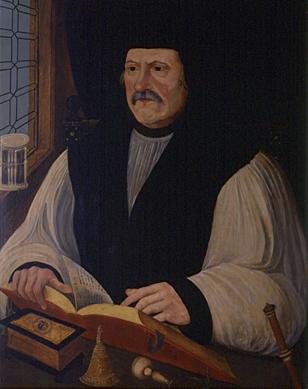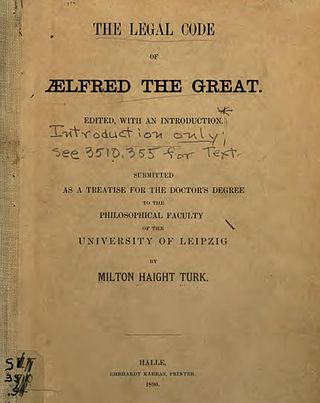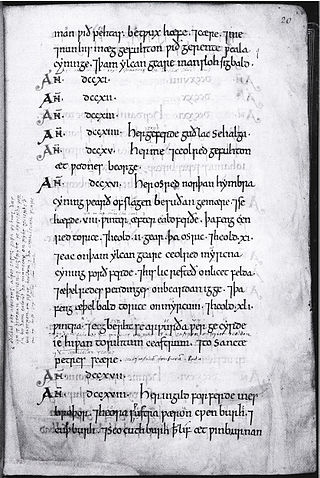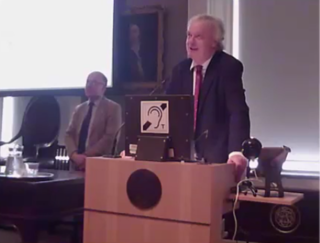
Matthew Paris, also known as Matthew of Paris, was an English Benedictine monk, chronicler, artist in illuminated manuscripts, and cartographer who was based at St Albans Abbey in Hertfordshire. He authored a number of historical works, many of which he scribed and illuminated himself, typically in drawings partly coloured with watercolour washes, sometimes called "tinted drawings". Some were written in Latin, others in Anglo-Norman or French verse. He is sometimes confused with the nonexistent Matthew of Westminster.

Matthew Parker was an English bishop. He was the Archbishop of Canterbury in the Church of England from 1559 to his death. He was also an influential theologian and arguably the co-founder of a distinctive tradition of Anglican theological thought.

Corpus Christi College is a constituent college of the University of Cambridge. From the late 14th century to the early 19th century it was also commonly known as St Benet's College.
William of Rubruck or Guillaume de Rubrouck was a Flemish Franciscan missionary and explorer.

The St Augustine Gospels is an illuminated Gospel Book which dates from the 6th century and has been in the Parker Library in Corpus Christi College, Cambridge since 1575. It was made in Italy and has been in England since fairly soon after its creation; by the 16th century it had probably already been at Canterbury for almost a thousand years. It has 265 leaves measuring about 252 x 196 mm, and is not entirely complete, in particular missing pages with miniatures.
West Saxon is the term applied to the two different dialects Early West Saxon and Late West Saxon with West Saxon being one of the four distinct regional dialects of Old English. The three others were Kentish, Mercian and Northumbrian. West Saxon was the language of the kingdom of Wessex, and was the basis for successive widely used literary forms of Old English: the Early West Saxon of Alfred the Great's time, and the Late West Saxon of the late 10th and 11th centuries. Due to the Saxons' establishment as a politically dominant force in the Old English period, the West Saxon dialects became the strongest dialects in Old English manuscript writing.

The Doom Book, Dōmbōc, Code of Alfred or Legal Code of Ælfred the Great was the code of laws compiled by Alfred the Great. Alfred codified three prior Saxon codes – those of Æthelberht of Kent, Ine of Wessex and Offa of Mercia – to which he prefixed a modified version of the Ten Commandments of Moses and incorporated rules of life from the Mosaic Code and the Christian code of ethics.

The Winchester Troper refers to two eleventh-century manuscripts of liturgical plainchant and two-voice polyphony copied and used in the Old Minster at Winchester Cathedral in Hampshire, England. The manuscripts are now held at Cambridge, Corpus Christi College 473 and Oxford, Bodleian Library Bodley 775 . The term "Winchester Troper" is best understood as the repertory of music contained in the two manuscripts. Both manuscripts contain a variety of liturgical genres, including Proper and Ordinary chants for both the Mass and the Divine Office. Many of the chants can also be found in other English and Northern French tropers, graduals, and antiphoners. However, some chants are unique to Winchester, including those for local saints such as St. Æthelwold and St. Swithun, who were influential Bishops of Winchester in the previous centuries. Corpus 473 contains the most significant and largest surviving collection of eleventh-century organum. This polyphonic repertoire is unique to that manuscript.

The Parker Library is a library within Corpus Christi College, Cambridge which contains rare books and manuscripts. It is known throughout the world due to its invaluable collection of over 600 manuscripts, particularly medieval texts, the majority of which were bequeathed to the college by Archbishop of Canterbury Matthew Parker, a former Master of Corpus Christi College.

The Anglian collection is a collection of Anglo-Saxon royal genealogies and regnal lists. These survive in four manuscripts; two of which now reside in the British Library. The remaining two belong to the libraries of Corpus Christi College, Cambridge and Rochester Cathedral, the latter now deposited with the Medway Archives.
Cambridge, Corpus Christi College, MS 139 is a northern English manuscript compiled in c. 1170. Apart from preliminary additions, it contains two separate volumes, comprising 180 folios in total. The original first volume has 165 folios in twenty gatherings, about half of which are occupied by the historical compilation Historia regum, which runs from f. 51v to 129v. In the sixteenth century, the codex was bequeathed by Matthew Parker to the Parker Library of Corpus Christi College, Cambridge, where it is held to this day.
The Leges Henrici Primi or Laws of Henry I is a legal treatise, written in about 1115, that records the legal customs of medieval England in the reign of King Henry I of England. Although it is not an official document, it was written by someone apparently associated with the royal administration. It lists and explains the laws, and includes explanations of how to conduct legal proceedings. Although its title implies that these laws were issued by King Henry, it lists laws issued by earlier monarchs that were still in force in Henry's reign; the only law of Henry that is included is the coronation charter he issued at the start of his reign. It covers a diverse range of subjects, including ecclesiastical cases, treason, murder, theft, feuds, assessment of danegeld, and the amounts of judicial fines.

The Norman Anonymous is the name given to the author of a collection of treatises, the Tractatus Eboracenses, dealing with the relationship between kings and the Catholic Church, written c. 1100. The author, whose identity remains a mystery, offered some of the most strongly worded defences of royal authority and even superiority to the Catholic Church ever uttered in the medieval West. Surviving in just a single manuscript, the text is the only contribution made by the Anglo-Norman realm to the Investiture Controversy.

John Joscelyn, also John Jocelyn or John Joscelin, (1529–1603) was an English clergyman and antiquarian as well as secretary to Matthew Parker, an Archbishop of Canterbury during the reign of Queen Elizabeth I of England. Joscelyn was involved in Parker's attempts to secure and publish medieval manuscripts on church history, and was one of the first scholars of the Old English (Anglo-Saxon) language. He also studied the early law codes of England. His Old English dictionary, although not published during his lifetime, contributed greatly to the study of that language. Many of his manuscripts and papers eventually became part of the collections of Cambridge University, Oxford University, or the British Library.
Cambridge University Library, Ff. i.27 is a composite manuscript at the University of Cambridge. It was formed by adding a 14th-century Bury St Edmunds book to a compendium of material from 12th-century northern England. The latter compendium had once been part of Corpus Christi College Cambridge MS 66. With its original content, it had at one time been at Sawley Abbey, though it was probably produced somewhere else, perhaps Durham. It is a source for the Durham poem, which describes the city and its relics.
Cambridge, Corpus Christi College, MS 178 is an English manuscript in the library of Corpus Christi College, Cambridge. The codex consists of two parts that may have been together since the thirteenth century. The first part, pp. 1–270, contains homilies for general occasions (1-163) and for festivals (164-270) and was compiled in the early eleventh century and derived from Worcester. The second part, pp. 287–457, contains Latin and Old English versions of the Rule of Saint Benedict. Both parts were glossed by The Tremulous Hand of Worcester.
John Pory (1502/03–1570) was an English churchman and academic, Master of Corpus Christi College, Cambridge.

A presentation miniature or dedication miniature is a miniature painting often found in illuminated manuscripts, in which the patron or donor is presented with a book, normally to be interpreted as the book containing the miniature itself. The miniature is thus symbolic, and presumably represents an event in the future. Usually it is found at the start of the volume, as a frontispiece before the main text, but may also be placed at the end, as in the Vivian Bible, or at the start of a particular text in a collection.

Christopher Francis Rivers de Hamel is a British academic librarian and expert on mediaeval manuscripts. He is a Fellow of Corpus Christi College, Cambridge, and former Fellow Librarian of the Parker Library. His book Meetings with Remarkable Manuscripts is the winner of the Duff Cooper Prize for 2016 and the Wolfson History Prize for 2017.

Thomas Markaunt was a Fellow and benefactor of Corpus Christi College, Cambridge University. He is best known for his sizeable bequest of seventy-five books to Corpus Christi library, which were lent out to the student body in a formal academic system of 'electio'. However he is also of note for his extensive compilation of early University records, known as "Markaunt's book", which gained him a historical reputation as an antiquarian. While the majority of his original bequest has not survived the centuries, the extensive electio records and surviving books have been the subject of much study.